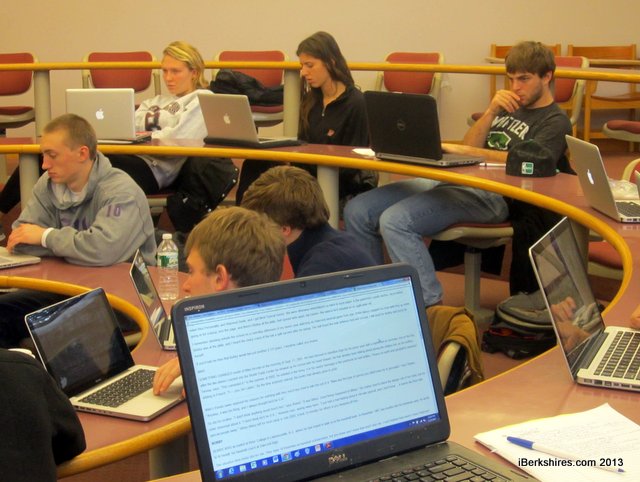Sports Illustrated Writers Teach Ways of Storytelling
|
Sports Illustrated senior writer and Williams alumnus Tim Layden is teaching a course on sports writing for the college's Winter Study program. |
WILLIAMSTOWN, Mass. — While tweets and blogs and sound bites may drive sports journalism in the 21st century, there still is a place for storytelling.
This past week, that place was the basement of Williams College's Hopkins Hall, where two of the industry's top storytellers were doing their best to pass the torch to the next generation of scribes.
Sports Illustrated senior writer and Williams alumnus Tim Layden is back on campus this month teaching a class to about 15 students as part of the college's Winter Study program. Last week, he was joined for a class by his SI colleague Jack McCallum, who lectured about the process of creating a long-form, magazine-style feature story.
Both Layden and McCallum said after the class that their industry is changing dramatically, and not all of the change is good. But Layden emphasized that even in a world dominated by the "Twitter-verse," old-fashioned prose is still a premium.
"Obviously, I think anyone who is a journalist right now is in the middle of the most dramatic change in the history of the industry," Layden said. "There are younger journalists who are more on the cutting edge of it than I am, but we're all caught up in it to some degree.
"I've tried to convey that to the students but also convey that the basic skills of reporting and writing and editing will never go away. You still need those fundamental building blocks. We've worked on a lot of those things."
Layden said one benefit of the technological revolution in his field is that there is more sports journalism — good and bad — than ever before. But he admitted that in the 24-hour news cycle, it may be harder for writers to get the kind of thoughtful editing that leads to polished stories and better writers.
Layden, who got his start in New York's Capital District at the Schenectady Gazette and Albany Times Union, said he does not have a good feeling for what happens at smaller daily newspapers today. But he would not be surprised if the editing process is much different than when he started at the Gazette in 1978.
"It's hard for me to say because it's been a long time since I've worked at that end of the business," said Layden, who was hired by SI in '94. "I don't know how much editing is going on on every blog. I do know that the stories I write for si.com are edited less than the stories I write for SI, much lesfs, because of the need for rapid posting and quick news turnover. Because of those things, there is just more of a need to get something produced and posted than to get it completely polished.
"I'm sure it is harder to get editing and to get taught. But, again, it's easier to get published. There's two opposing forces there, almost."
McCallum said even at the venerable Sports Illustrated, the editing process is more streamlined than when he joined the magazine in 1981. What he described as a "seven-pronged process" then may have actually dilluted the prose, he said, so streamlining is not necessarily a bad thing.
On the other hand, too little editing has its pitfalls.
"It became very scary for me when I would write something, and I wasn't even 100 percent sure — and I shouldn't admit that as a journalist, but there were times with the time constraint — and I sent it to the website, and 10 minutes later it's out on the website," McCallum said. "That is very scary. And I have made errors.
"And I think at the end of the day, the product ... I'm not going to say it's dumbed down. But what I am going to say is the process of thinking about a story and thinking about the exact word choice and thinking about the context has been somewhat eradicated by the Internet.
"You can't put the genie back in the bottle."
McCallum talked about word choice and context during his stint as a guest lecturer on Tuesday. He also touched on alliteration, the use of concrete details, the importance of a "nut graph" that delivers the essential point of even the longest story and how to draw in the reader on an emotional level without being maudlin.
"You want to write something emotional, not sentimental," McCallum told the class. "That's a hard line sometimes. This isn't 'Oprah.' This isn't 'The Today Show.' ... That's not what print journalism is about."
Williamstown's Dylan Dethier is a Williams junior, a student-athlete, a student in Layden's class and a fan of sports journalism. He also is a soon-to-be published author himself. He has a book coming out this spring about his experience touring the nation to play a round of golf in each of the contiguous 48 states during his "gap year" between Mount Greylock Regional High School and Williams.
Dethier said the class has helped him think about the changes in sports reporting.
"We've talked about everything from early journalistic pieces by Grantland Rice about Notre Dame football and the difference between the way he wrote about sports versus we just talked about: Jadeveon Clowney's hit on Vincent Smith (in the Outback Bowl)," Dethier said. "That [play] has millions of hits on YouTube, and there are ways now that snippets like that become stories, rather than the mythical Notre Dame football team with the Four Horsemen.
"It's interesting to see the doors that [technology] opens and the doors it closes."
Dethier said he is not sure whether he will stay with journalism himself, but he is sure some kind of writing and storytelling is in his future. He does know Layden's class will help inform his decisions down the road.
| Layden's Sports Illustrated colleague Jack McCallum joined the class last week for a lecture on magazine-style writing. |
 |
 |
|
Williams sophomore Taylor Foehl, also of Williamstown, is more certain he will not end up writing about sports professionally. But the political science major and varsity squash player said the class has given him insight into the material he consumes as a fan and reader.
"Just being interested in sports and being able to listen to Tim [Layden] talk about writing, even if I'm not going to go into it, it's been a great experience," Foehl said. "I'm definitely learning about what the writers are thinking about when they're writing a piece and the mechanics of it and logistics of it. Reading the writing we've been assigned, I've definitely been thinking about things differently."
For his part, Layden is relishing the role of instructor at Williams, where he was a member of the class of 1978 and is a parent of 2010 grad Kristen Layden.
It is his first time teaching a class, and he figured the monthlong, non-credit Winter Study course was a good way to get his feet wet in academia. He did say if he was to teach the class again, he would take a leave of absence from SI, which had him covering college football's BCS National Championship game in Miami three days after his first class session.
Next month, he will be back to his regular life on the road covering the sports from track and field to thoroughbred racing to the NFL. The travel has been a fact of life since he started with SI. In other ways, he has had to adapt. But Layden hopes to emphasize to his students that the core of his job remains the same.
"I'm still successful in the business working within primarily my own skill set, which is medium- and long-form storytelling," Layden said. "I've also added enough blog type writing and tweeting to try to be versatile. But I still think you have to have a go-to area in your skill set. I don't think everybody can be everything.
"My default position as a veteran in the business is the best path to a career in it — and it's not an easy path — is quality. It's still better to be good than just be writing. It's still better to write and report well than just to write aimlessly and get published. I don't think there's longevity in that kind of career."
Tags: , journalism, reporting, sports writing, Williams College, writing,
















